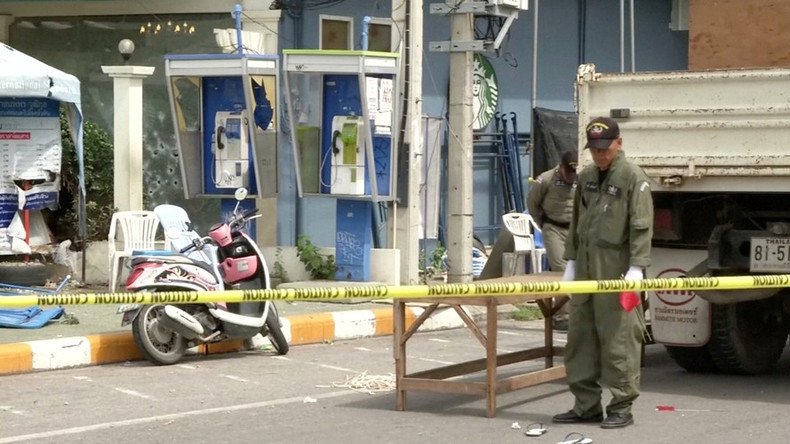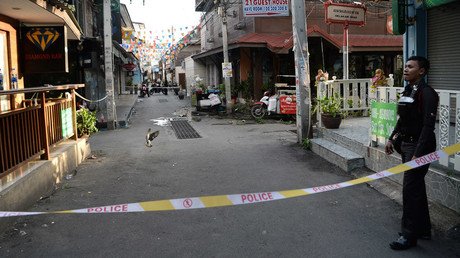‘Bangkok blames political opposition, not Islamic terrorists, for attacks on tourist spots’

The timing of the recent blasts in Thailand, coinciding as they do with the Thai queen’s birthday, makes a connection with the political opposition more likely as many of them oppose the monarchy, Sreeram Chaulia, from the Jindal School of International Affairs, has told RT.
Thailand was rocked on Thursday morning by a series of bomb blasts in five provinces across the country – including one of the country's most popular beach resorts, Phuket – in attacks that seem designed to strike at the heart of the country’s bustling tourist industry.
At least four people were reportedly killed and many more injured, including foreigners. The incidents happened a few days after the country overwhelmingly voted in favor of a new military-backed constitution.
According to Thai police, the blasts were connected to “local sabotage,” not Islamic terrorism.
New bomb attacks kill at least 4 in #Thailand, reports of many injuredhttps://t.co/TTXkpvG7yhpic.twitter.com/vccwYPhypl
— RT (@RT_com) August 12, 2016
RT: Who could be behind the attack in your opinion?
Sreeram Chaulia: The deputy prime minister of Thailand said he believes it was one group, which is not the Muslim insurgence of the southern provinces. These attacks have not happened in the separatist southern province, where there are Muslims who are opposed to ethnic domination by the Thai Buddhists and have run a long-term insurgency there. So this doesn’t seem to be linked at all to that case. It is not jihadist violence, it seems, from the government’s perspective. But rather they want to blame the opposition linked to the former prime minister, Thaksin Shinawatra.
The timing – it is the Queen’s birthday – makes it all the more likely that there is some kind of link with the political opposition, because there are Republicans among them who oppose the monarchy. Traditionally, the Thai military, which is currently ruling, has been closely associated with the monarchy. And together Buddhism, the army and the monarchy have dominated Thai politics for a long time.
Shinawatra… created a kind of a democratic challenge to this establishment, and since he has been ousted a lot of his followers are on the run, jailed and exiled. Shinawatra himself is out of Thailand. His sister has been prosecuted... So it does look like they are going to blame the Red Shirt movement, or those who are associated with it.
RT: This happened five days after a referendum on a new constitution, drafted by the military, and seen as strengthening military rule in the country. Do you think these bombings are linked to that referendum?
SC: Yes, absolutely. You see, the referendum in a way is re-establishing the fait accompli that the military had done through a coup... So General Prayut [Chan-o-cha] and his junta essentially are now saying that we’re never going to go back to the past, when Shinawatra and his radicalism was challenging the Bangkok establishment... There is a big social division in Thailand, and the military is very ham-handed in the way it handles the opposition. It doesn’t have any other means except brutality. Military dictatorships as you know worldwide create a lot of political alienation and resentment.
When people find out that they have no outlet and the establishment is hunkering down for long rule. Remember King Bhumibol [Adulyadej] himself is very old and is not active in politics anymore. It looks like the military essentially is running the country in the name of the king.
In this kind of situation there is going to be a backlash. Remember Hua Hin and Phuket, the places where the blast happened, have a lot of foreign tourists. It is known for being the backbone of Thai tourism – these two places. The choice of these two places shows that there is frustration in the opposition.
Tourism in Thailand faces threat
Binoy Kampmark, researcher in Global Studies at RMIT University, said that so far questions on these attacks remain unanswered.
RT: So far no one has claimed responsibility for the attacks. What are your thoughts on who could possibly be behind this?
Binoy Kampmark: What is striking is that the particular areas where these strikes have taken place – they tend to be in a beltway, for example, of an ongoing insurgency that doesn’t tend to touch the tourist areas very much at all. It is worth noting that the ongoing southern insurgency doesn’t tend to interfere with the tourist spots generally. But this is different, and so far as these particular attacks just a change of tactics, whether it is connected with that Thai authorities so far say it is unlikely; whether it is connected with a local disputes remains to be seen.
RT: Tourist locations across the world are being targeted now. Is this a very deliberate tactic?
BK: I do think that is very much a case of hitting a particular place where it hurts most and in country such as Turkey and the stretch in a resort town like Nice in France. The names like Phuket, for example, are very known in the broader sense of the international traveling fraternity, if you like.
Obviously the attacks when they are precipitated are done to cause maximum damage and with maximum affect; and what better to hit a particular state or particular country than to target its tourist appeal? And were tourists to be more fearful about traveling to Thailand, which has tourism as a huge money earner, this would be significant for the government; it would be significant for the state.
The statements, views and opinions expressed in this column are solely those of the author and do not necessarily represent those of RT.













